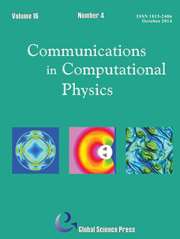Article contents
Distributional Sensitivity for Uncertainty Quantification
Published online by Cambridge University Press: 20 August 2015
Abstract
In this work we consider a general notion of distributional sensitivity, which measures the variation in solutions of a given physical/mathematical system with respect to the variation of probability distribution of the inputs. This is distinctively different from the classical sensitivity analysis, which studies the changes of solutions with respect to the values of the inputs. The general idea is measurement of sensitivity of outputs with respect to probability distributions, which is a well-studied concept in related disciplines. We adapt these ideas to present a quantitative framework in the context of uncertainty quantification for measuring such a kind of sensitivity and a set of efficient algorithms to approximate the distributional sensitivity numerically. A remarkable feature of the algorithms is that they do not incur additional computational effort in addition to a one-time stochastic solver. Therefore, an accurate stochastic computation with respect to a prior input distribution is needed only once, and the ensuing distributional sensitivity computation for different input distributions is a post-processing step. We prove that an accurate numericalmodel leads to accurate calculations of this sensitivity, which applies not just to slowly-converging Monte-Carlo estimates, but also to exponentially convergent spectral approximations. We provide computational examples to demonstrate the ease of applicability and verify the convergence claims.
Keywords
- Type
- Research Article
- Information
- Copyright
- Copyright © Global Science Press Limited 2011
References
- 5
- Cited by


